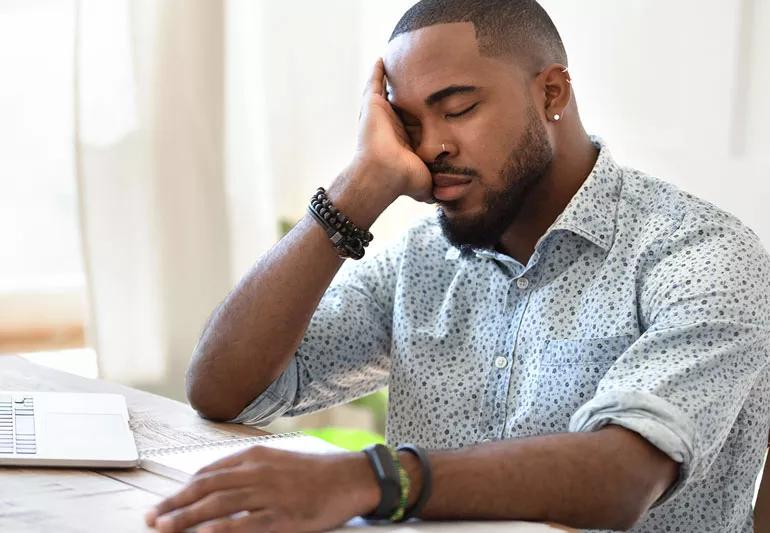How this common sleep problem causes confusion and strange behavior upon waking

Image content: This image is available to view online.
View image online (https://assets.clevelandclinic.org/transform/2ed50221-685a-4da7-9d69-c1a82552c80b/sleepDrunk-1177334859-770x533-1_jpg)
man too spleepy for work
You’re sound asleep when your alarm goes off or your partner tries to wake you. You open your eyes and get out of bed, but you’re not fully awake. You wander around, say strange things or give blunt answers when someone talks to you.
Advertisement
Cleveland Clinic is a non-profit academic medical center. Advertising on our site helps support our mission. We do not endorse non-Cleveland Clinic products or services. Policy
And when your partner mentions your behavior later, you have no memory of it. What happened? You were probably sleep drunk. And you’re not alone — this condition affects at least 1 in 7 people.
Sleep specialist Juancarlo Martinez-Gonzalez, MD, explains this common condition and what you can do about it.
Sleep drunkenness is a casual term for confusional arousal, which is a type of parasomnia. A parasomnia is an unusual behavior that happens while you’re asleep or just waking up.
Confusional arousal is a problem with sleep inertia when your brain transitions between sleeping and waking up. When you’re sleep drunk, your brain doesn’t make the transition to wakefulness. Your conscious mind isn’t fully awake, but your body can get up, walk and talk.
“People who have confusional arousal might act confused or have trouble speaking,” says Dr. Martinez-Gonzalez. “They might appear to be drunk, but they’re not.”
Sleep drunk episodes may last for just a few minutes or up to an hour. It can affect people of all ages, from children to adults.
If you’ve ever been sleep drunk, your partner or family member may have gotten a laugh out of your unusual behavior. “If it happens once a year and no one gets hurt, you probably don’t need treatment,” says Dr. Martinez-Gonzalez.
Advertisement
But don’t take this condition lightly if it happens frequently. In rare cases, people have harmed themselves or others while sleep drunk. Some people have tried jumping out of a window, and others have shown violent or aggressive behavior.
It can also interfere with your relationships if it bothers your partner or family members. “Some people end up sleeping in separate rooms, and that can have a negative impact on you and your partner,” says Dr. Martinez-Gonzalez.
In many cases, there is no obvious cause. But you may be more likely to experience sleep drunkenness if you:
Most people have no memory of sleep drunk episodes, so they probably don’t know to seek help. “Usually, people find out about this issue through their partner or family member,” says Dr. Martinez-Gonzalez. “If your family member tells you that you act strange when you wake up, and you don’t remember it, see your doctor.”
There is no specific test to diagnose sleep drunkenness. But your doctor may review your medical history, including any health conditions you have and medicines you take. A medical history helps your doctor determine an underlying cause for the issue.
Some people may need a sleep study, which can diagnose sleep disorders. During a sleep study, you’ll wear special sensors that measure your brain waves, movements, heart rate and other health indicators while you sleep.
For some people, healthy sleep habits can eliminate sleep drunk episodes. “A regular sleep schedule is one of the best ways to improve your sleep and reduce the chance of having confusional arousal,” says Dr. Martinez-Gonzalez. “Have a consistent bedtime and wake-up time and stick to it every day. Most adults need at least seven hours of quality sleep each night on a regular schedule.”
Other ways to get better sleep (and avoid sleep drunkenness):
If these steps aren’t enough and you’re still having sleep drunk episodes, talk to your doctor. Some people may need medication to reduce or eliminate the issue. Or you might have an undiagnosed sleep disorder or other health condition that needs care.
Advertisement
“Confusional arousal is common, but you don’t have to live with it,” says Dr. Martinez-Gonzalez. “Treatment can help you get better sleep and wake up feeling like yourself again.”
Advertisement

Sign up for our Health Essentials emails for expert guidance on nutrition, fitness, sleep, skin care and more.
Learn more about our editorial process.
Advertisement
Pain, light exposure and anxiety are just a few factors that could be waking you up in the middle of the night
Stress, alcohol, sleep apnea and (you guessed it!) scary movies are a few common causes of bad dreams
It’s normal to oversleep occasionally, but sometimes, there might be an underlying cause
Tame racing thoughts with breathing exercises, screen time limits and connecting to your body
Signs, causes and ways to address this problem
Tips for readjusting your sleep cycle
Sleep masks can help you create total darkness so you can sleep better
To avoid sleep deprivation and shift work sleep disorder, try adopting habits that minimize light exposure and prioritize daytime sleep
Prioritize your health by managing stress, strengthening your social connections and getting quality sleep
Bolsters, blankets, pillows and blocks can offer extra support, stability and comfort
Allergies, postnasal drip, asthma or reflux could be to blame for a cough that won’t quit